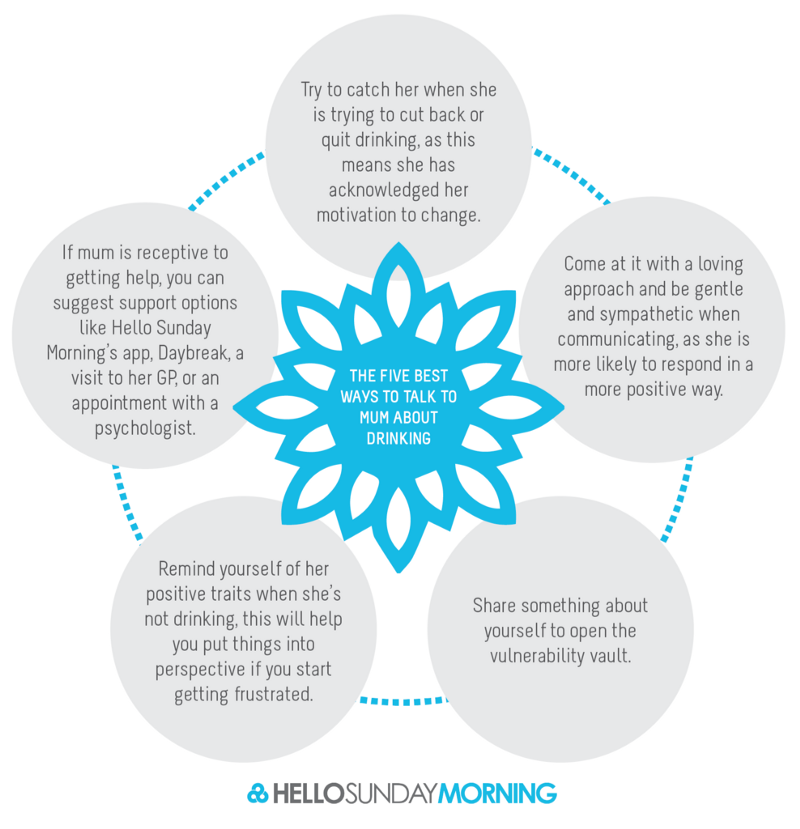
The five best ways to talk to mum about her drinking
We spoke to Talitha Cummins about stigma and the best approaches to opening up a conversation
“Such is the strength of denial when it comes to drinking … that a child talking to their parent may not even hit home.” — Talitha Cummins
Generally, mums are known to talk a lot. They call for a chat about anything: to tell you a trivial incident that happened at the shops; to remind you to pay your health insurance bill; or pester you to take back a stored box of clothes in your old room. But because mums are so used to helping others and putting themselves last, it can be hard to turn it around and open up a conversation with mum about how she may be drinking.
At Hello Sunday Morning, we refer to the mums in the Daybreak communityas ‘supermums’; they’re superheroes in our eyes. But the thing is, that’s a pretty high standard to live up to, and it can come with a lot of pressure. So far, Hello Sunday Morning has supported 80,000 women on their journey to change their relationship with alcohol. Our statistics show 56 per cent of female members on Daybreak have children, and of those mothers, 7.4 per cent have over six drinks daily or almost daily.
We spoke with mother, Australian journalist and Hello Sunday Morning ambassador, Talitha Cummins, about why there is a stigma attached to mums who drink and why it’s so hard for mothers to accept that they may need help to change their relationship with alcohol:
“We’re very good at drinking but we’re not very good at acknowledging the problems that come with it. There’s a tendency for people to sweep this issue under the mat because it’s a little bit too confronting. Research shows that women in their late 30s and early 40s have caught up to men on the drinking front for a number of reasons, like women entering the workforce and equality. I also think there’s an extra layer of stress on women who do a lot of the work looking after the children as well as working full time and that adds another layer of pressure. Alcohol is used to relieve that pressure. Too much of relying on that to relieve the pressure creates a problem.”
Talitha described herself as the definition of a high-functioning drinker, a category that we find often gets overlooked by GPs and social groups because they break the traditional stereotypes of alcohol dependency: a bedraggled man carrying a paper bag with hard liquor around the street.
“I would get up in the morning and go for a run no matter how much I’d had the night before. If I could get up and go for that run and turn up to my hair and makeup and present well, than I thought the alcohol wasn’t having an effect on me. I’d still be able to work all day and it wasn’t until I got home that night that I’d start drinking again. So on the face of it, I was still doing my job, perhaps not to the best of my ability, but it wasn’t a problem until it was. Things became unmanageable for me.”
Talitha thought she was the only one who knew that her drinking was getting out of hand. It took an intervention from her Chief Of Staff at work who sat her down and asked her if she was okay, for her to allow herself to accept the situation.
“I think I was just at the right point and I said ‘no’ and I just crumbled. I was ready for someone to reach out and say anything to me because I was just so sick and tired of going through this whole thing of drinking, feeling shame and guilt and drinking to make myself feel better.”
Talitha says it is so difficult to talk to a parent about their drinking because in a lot of instances, they won’t accept they have an issue themselves.
“I spoke to a parent this week whose daughter won’t speak to them because of their drinking. But this person is still in complete denial about the problem and wants to stop drinking, but not even being told by their child that there’s an issue makes them see that they need help.”
So, how do you begin the conversation with your mum about her relationship with alcohol?
There are many ways you could approach the topic, and the best for you may vary depending on your relationship with your mum. Talitha recommends a loving approach.
“I know there can be a lot of fall out from things that may have happened with the parents drinking, but approaching lovingly from a good place and making sure they understand that you’re there to support them is a good start to then let them know that you also think they need to seek help.”
You could also try opening up yourself and sharing something about your experience, such as:
“I have been thinking a lot about my relationship to alcohol lately. I have realised that it has been really valuable for me to reflect on it.”
Saying something personal demonstrates to the other person that you are comfortable (or maybe uncomfortable, but open to) being vulnerable around them.
In her TED talk, Dr. Brene Brown discusses the power of vulnerability. It is exceptionally difficult to let yourself be vulnerable in front of others.
“Courage starts with showing up and letting ourselves be seen,” says Dr. Brown. Letting ourselves be vulnerable.
“Staying vulnerable is a risk we have to take if we want to experience connection.” Which, many have argued, is sort of the point of everything. We are wired to connect to other people, it’s one of the things that has enabled humans to be so successful as a species and it is a powerful tool for the healing process.
But what if mum doesn’t see an issue and gets defensive?
It may be a good idea to be prepared for this reaction, as drinking carries with it a lot of negative stigma from our society and is linked with feelings such as shame and guilt. Which is ironic, as the social pressure and expectation to drink alcohol is massive.
Talitha points out that confrontation is often avoided because of the expectations that you should be able to handle your drinking.
“None of my friends actually confronted me about it, despite them seeing some of the things that I was doing. It’s awkward not only for the person who is drinking, but for the friends as well; they don’t know what to say, so there’s this embarrassment around it on both sides.”
People can become enraged at a suggestion that they may be drinking too much and deny that they need help. You may find a breakthrough and the person will acknowledge their drinking, but they may deny addressing it, saying something like: “I can stop anytime I want to” or, “Everyone drinks to unwind sometimes.”
A Washington Post article written by Sara Amato, shares her story of struggle when confronting her mum about her relationship with alcohol and the positive opportunity she got out of the experience.
“Over the years, I tried to talk with her about her alcoholism, but she never wanted to hear it. It forced me to come to terms with the fact I couldn’t change her and that it didn’t need to weigh me down. She refused to recognise she had a problem and actively denied it whenever I brought it up. I could pour her wine out, but she’d still find ways to drink. If she wasn’t willing to change then it couldn’t be my problem anymore.
Her drinking forced me to be more cautious. It wasn’t until after college that I started drinking socially. I thought that if I drank anything, I would turn into her. But the more she denied she had a problem, the more it dawned on me that I wasn’t her. I had developed more self-awareness and control than she had ever shown me. But that realisation didn’t happen overnight. There was never any therapy sessions or group programs, there was only time. Most importantly, I realised that talking about these issues and getting help isn’t shameful, because [drinking] isn’t a one-person [issue]: It affects everyone. I know that now at 27, but when I was 16? No, I was really stubborn. It took me a long time to realise that letting people in doesn’t make you weak. And you should never feel alone when dealing with a loved one’s addiction. Because you’re not.”
Here are a few tips to help you take the blame off yourself
Firstly, you need to acknowledge the issue. You may be in denial to protect your parent or hide the issue. Admitting that your parent needs support, even if they won’t, is the first step in taking control.
Don’t blame yourself and be aware of your emotions. Accepting and acknowledging helps you put things in perspective. Remind yourself that you are not responsible for your parents drinking too much and that you cannot cause it or stop it, only they can. Recognising how a parent’s drinking makes you feel can help you from burying your feelings and pretending that everything’s fine.
Learn healthy coping strategies. When we grow up around people who turn to alcohol or other unhealthy ways of dealing with problems, they become our example. It may be a good idea to find some role models who can help you learn healthy coping mechanisms and ways of making good decisions.
Find support. Talk to people that may have gone through a similar thing and find support through Hello Sunday Morning or other support programs.
“To people out there who are in the midst of a drinking issue, life can get better. I was in such a low place too and I never thought that I would find the allusive happiness. But with a lot of hard work, you can get there. There is hope.” — Talitha Cummins
Hello Sunday Morning is a movement towards a better drinking culture. Our vision is a world where drinking is an individual choice, not a cultural expectation.
How do you feel about your relationship with alcohol?Download Daybreak, for iOS or Android to change your drinking habits today. Alternatively, join our online community of over 100,000 like-minded individuals.











It’s been 27 years–my entire life–that my mom has had a problem with drinking. I moved away for 6 years, travelled internationally for 6 months, and just two months found myself back in my childhood home, living with my mother again. All of the negative emotions and problems are ever prevalent again, as I see it every day again. The drinking at 8 am, drunk all day, angry commentary, evil energy. It’s a nightmare. I too have an addictive personality. I have been prescribed adderall for years and my mom uses this against me anytime I try to confront her drinking problem. I have admitted that I am dependent on it and that I wish I weren’t. I am living back home to get myself back on my feet as I’ve spent a lot of money on my travels/lavish lifestyle that I chased (likely from not having it growing up). I started working in real estate at age 19 and that allowed me to move out and support myself. During this season of transition, my emotional control and communication skills are being put to the test on a daily basis. I do know that I cannot help my mother, and that she can only help herself, though I still try to say things in hopes of getting through to her. Nothing works. For anyone out there who feels alone in a similar situation, know that you are not. I wish the best for myself, for my mother, and for everyone struggling with this reality. I am focused on bettering my own life, and getting back to a healthy place. It’s easy to fall back into old thought patterns, especially around things that have triggered us in the past. All the best.
Alcoholism in the family is a terrible thing. I know that very well. We struggled with it for many years until my dear friend recommended the guide by Ellen Petersen. I got it here – https://www.net-boss.org/shop/how-to-help-an-alcoholic-you-love
Excellent approach, which turned out to be a godsend!
I do agree with Janine! After reading her comment, I decided to read Ellen Petersen’s guide, and I can easily say that it’s the best guide so far. I really like this approach and believe me I have read a lot of books in my life about alcoholism. Thanks Janine – sharing good things with people who need help is very important! This book helped me a lot.
I’m with you Janine and Kelly. It was so worth to spend a few $ to read this guide and change my perspective. I’m glad it’s a short guide and not 300 pages. Thanks!
This Ellen Petersen’s guide is brilliant! I’m surprised that I haven’t heard of it before!
My mom wakes up and I’m pretty sure she drinks vodka, we are on vacation and this morning I was looking for my 3 month old sister’s burp rag, amd I saw a bottle of vodka and a cup next to her bed, we went later in the day to go to a vr place and she said “go inside kids I need to talk to eddie real quick,” we went in and I saw her taking shots. Shes going through a bad divorce and I think that’s why? She smokes alot too, I dont know how to come to her. Please help me as soon as possible
We are sorry to hear about the difficulties you’re going through. Our page https://hellosundaymorning.org/the-talk-we-needed/ focusses on talking to loved ones about their drinking, and might be of help to you.
There are also services available outside of Hello Sunday Morning that will be able to support you. We recommend contacting your local health service or doctor for advice and support.
My mum drinks wine basically every night when she’s not working, she’s also a high functioning alcoholic so she can make out that everything is fine but she sneaks around and tries to hide it although never very well, when I read this as well as a few other websites I’ve visited tonight I’ve just sobbed because it really just struck a big nerve. I really just don’t know what to do anymore I’m only 17 and she’s had this. Problem for about 4 years now I’m just so tired of seeing her this way and I’m now just becoming more and more depressed I really am just tired at this point and I have no more answers. I’ve tried the loving approach time and time again, she says she’ll do better and for a little while she is (2-3 days) until I find a bottle and a glass still half full in her room as she passes out. And when I find that it’s just another part of me being broken down and destroyed. I can’t trust, I can’t relax my minds always racing and I’m always so frustrated and now I’m just beaten down. My Mothers my world and I can’t cope with this anymore I have no idea what I’m going to do. I live for my mum but seeing her this way is so mentally damaging. She says she knows she has a problem and she can feel it affecting her body and yet there’s no stopping. I just don’t even know if I want to be here. I have siblings and they know about her problem but I find I resist telling them about her relapses or how bad it really is because I’m afraid of what they’ll do or if they’ll stop talking to her and how that’ll affect her. This is really the first time I’ve put this all into words and just expressed myself and I frankly don’t know if I’m even going to post this.
Thank you for sharing H – we know how difficult it is for you to express how you’re feeling for the first time.
It sounds like it’s a tough time for you right now, we want you to know that there is support available.
Check out the Daybreak app to connect with others who may be going through a similar experience or reach out to a health professional such as GP. Lifeline is also available for support 24/7 on 13 11 14.
Take care, The HSM Team.
I wasn’t sure if my mum was an alcoholic as she doesn’t drink everyday. She also doesn’t get violent or really nasty so I didn’t think it could count or that I was just being dramatic. However the amount she drinks I’ve realised can not be healthy and she can say hurtful things. She gets defensive when she’s drunk like she feels guilty so she starts telling me to f*ck off and give her 5 minutes peace. It’s every other night or at least 4 times a week. She will drink from 7pm in the evening to 7am until she is black out drunk. I hate seeing her this way, when I wake up early to find her passed out it makes me angry because I know it will just happen over and over again :(. I’m so close to her she’s literally my best friend but every time we’ve had a conversation about it nothing has changed. It’s so awkward I don’t know what to do, I don’t want it to get worse.
Hi Grace,
Thank you for sharing. It sounds like it’s a tough time for you right now and we want you to know that there is support available.
Check out the Daybreak app to connect with others who may be going through a similar experience or reach out to a health professional such as GP. Lifeline is also available for support 24/7 on 13 11 14.
Take care, The HSM Team.
Due to COBID restrictions, i have not seen my parents for two years. I am currently staying with them and have noticed my mum’s slow daily decline into a drunk. My father is living with cancer and she is very mean to him. She tells him to stop being pitiful, that he’s pathetic and bullies him to an extent. She herself is a cancer survivor of five years and i believe her drinking stems from cancer surgery that went wrong to my father than being diagnosed and her feeling out of control. She drinks on the sly. Hides her alcohol in a coffee cup and currently has five empty wine bottles stashed away in the pan cupboard. I have, unsuccessfully, tried to talk to her twice and she shouts, cries and continues with her behaviour. She is not the Mum I once looked up to, loved so badly it hurt and saw as my hero. I am beginning to resent her for both her behaviour and actions and am desperate for her to see that she has a bad relationship with alcohol but know that I will just NOT be heard.
My mum and dad like to drink tequila Red bull red wine White wine voldka beer rum gin alcohol whiskey